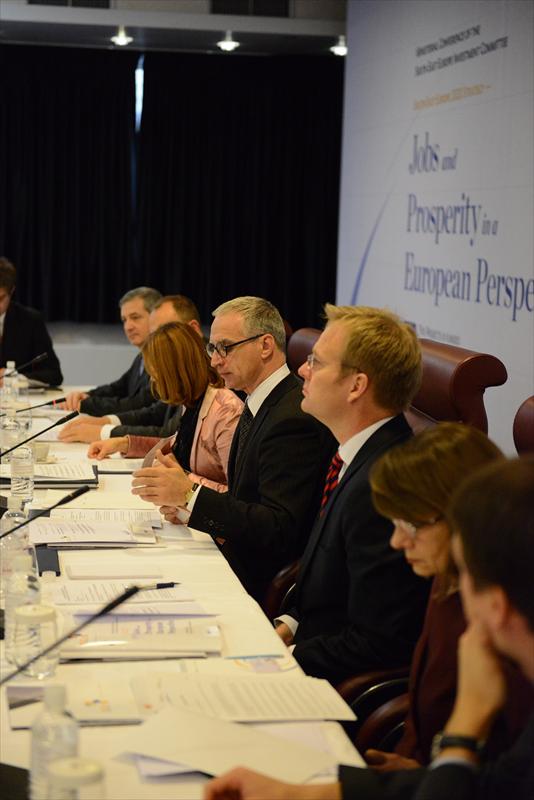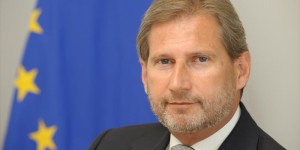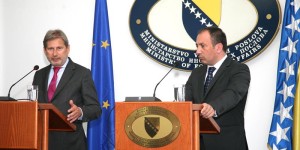Ministers
Ladies and gentlemen,
Good morning.
First of all let me greet you on behalf of Commissioneer Füle who recognizes the great efforts done in regards to SEE 2020.
Let me begin on a positive note.
2013 has been a good year for the EU enlargement process.
Regional co-operation and the principle of good neighbourly relations have left an important mark.
The historic agreement between Belgrade and Pristina has moved both sides closer towards the EU.
Further progress in this story will depend greatly on the continued good co-operation between both capitals and on their constructive approach in regional fora.
However, regional cooperation cannot simply remain a ‘condition’ for taming the conflicts of the past.
Regional cooperation needs to be strengthened because it makes good economic sense.
Regional cooperation links together countries that are small economies and that face similar development challenges.
Today, the Economy is a common challenge across Europe..
The European Commission has been alerting the candidate countries, potential candidates, as well as all EU Member States, that since the outbreak of the global economic crisis, we must admit that economic convergence is not a guarantee of economic prosperity as a consequence of the accession process.
So countries in the region need to do more in terms of improving national economic policies and their respective approaches to good governance.
Indeed, the 2013-2014 EU Enlargement Strategy put this issue of economic governance at the centre of debate.
The EU’s insistence on the importance of economy development is not new.
We have been promoting and supporting regional ideas to improve economic governance as far back as 2010.
We recognise that the countries in the western Balkans need to understand more fully the Europe 2020 strategy and its methods of work.
We recognise that there is no clear-cut acquis that will directly guide such economic competitiveness and employment.
This is why we proposed that the region undergoes a review of its own needs and proposes a regional approach to the exchange of best practice and joint policy making in those policy areas that have a cross border effect.
At this point, it is important and necessary to say that the Regional Cooperation Council, the countries of the region, and the OECD in our view have done an impressive job in preparing the comprehensive strategy that is before you today.
This strategy, I believe, commits governments and provides clear policy guidance to many regional initiatives on how to best engage with national governments in order to make best use of regional cooperation.
The strategy has the potential to bring about economic recovery and to support the reforms needed for EU accession.
In fact, a fully functioning market economy with the capacity to compete inside the EU Single market are accession criteria as defined by the Copenhagen European Council.
We believe that if the strategy before you today is fully implemented, it could also serve to improve the image of the region.
It will go quite some way to show that this region is capable of cooperating, is capable of collective strategic thinking and, finally, is capable of moving up the economic competitiveness ‘ladder’.
Yet, although the strategy may need revision, in the mid-term, it now needs to be implemented!
Yet if we are serious in wanting to the strategy to succeed, this process must never become centralised.
Given the nature of policies for employment and economic competitiveness, national governments must take the lead in all aspects of design and implementation.
Ladies and gentlemen,
The European Union belive that the countries of the region must succeed to effectively identify and implement the necessary national reforms.
That is why we think and welcome that countries need to adopt national action plans for SEE 2020!
The RCC, as well as other regional initiatives have an important role to play in acting as’policy facilitators’ to all national efforts made.
Such facilitation needs to provide effective and timely guidance, technical assistance and secure transfer of best practices.
We stand ready to support all countries in this process, such as through cooperation with OECD.
But the EU Commission’s 2013-2014 Enlargement Strategy emphasised another important aspect of the strategy’s implementation, namely ‘monitoring’.
We believe that the public monitoring of national efforts and achievements are keys for success.
Public monitoring will help ensure a dynamic process,
Public monitoring will commend those high performers and
Public monitoring will also highlight less high performance.
We believe that the RCC, with its significant political leverage, is well positioned to perform this important role.
In fact, we see the monitoring of the strategy as the basis for political involvement.
The annual ministerial meetings need to acknowledge any progress made, or to highlight areas of concern that need to be addressed.
In particular, these meetings need to endorse those further steps needed for the reform process to flourish.
So far, these meetings have been somewhat preoccupied with the drafting the strategy.
As I have said earlier, it is a good strategy.
But now we need to move this debate a long.
We now need to see the strategy being fully implemented.
We have no doubt that the rewards for doing so eventually will come.
In the meantime, the Commission is equally interested in the monitoring of results and progress made towards meeting all targets set.
Ladies and gentlemen,
A couple of words on how the EU plans to support the implementation process.
As I have already mentioned, during 2014 we will be helping to enhance economic governance approaches with all enlargement countries.
Let us be clear, as already touched upon by Goran – none of the countries in this region are currently fully functioning market economy.
Large trade deficits with the EU point to a lack of economic competitiveness.
Therefore, a key part of our future engagement will focus on strengthening this issue.
As the basis of our continuing dialogue, the countries will be asked to prepare a ‘National Structural Reforms and Competitiveness Programme’.
These country programmes will then be discussed, in more detail, in various SAA subcommittees and will then be evaluated in the annual progress report.
It is clear that large parts of this programme overlap with the national plans for the SEE 2020.
In this sense, the work that you will do now can be used for your activities with the Commission, and vice versa.
In our view, Pre-accession economic dialogue and the SEE 2020 process are fully complimentary and compatible.
As the EU attach such importance to reforms in the areas of employment and economic competitiveness, not surprisingly we have placed these topics high on the list of priorities for funding under IPA 2.
Reforms designed under the SEE 2020 will be better than reforms designed in close national circles.
Therefore, we will earmark funds for them, either for technical assistance to preparation these reforms or for concrete implementation, including new infrastructure.
Ministers,
Ladies and gentlemen,
The importance of recovery, the opportunities of EU accession and the benefit of regional cooperation are the three main reasons that should guide the SEE 2020 moving forward.
I and my team, as well as our colleagues in Brussels will continue to do our best in assisting the Government of Bosnia-Herzegovina to implement its regional commitments under SEE 2020.
I wish to congratulate you on the new strategy and I am looking forward to reading the SEE 2020 implementation report in the autumn next year.
Thank you.




